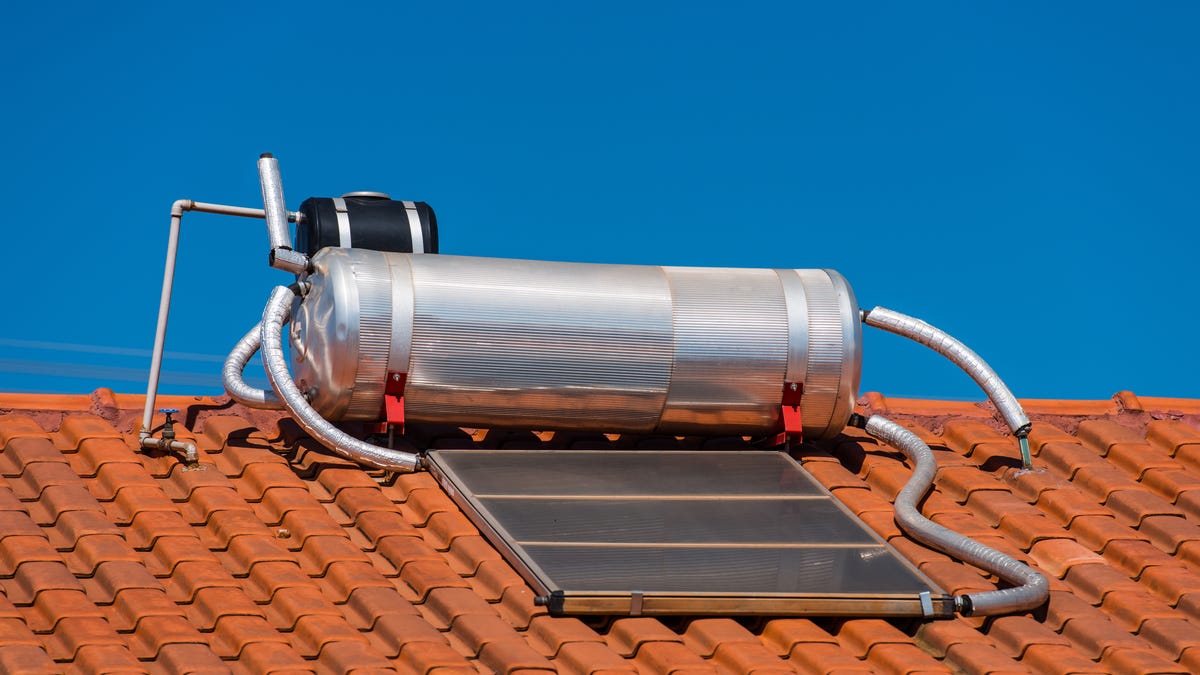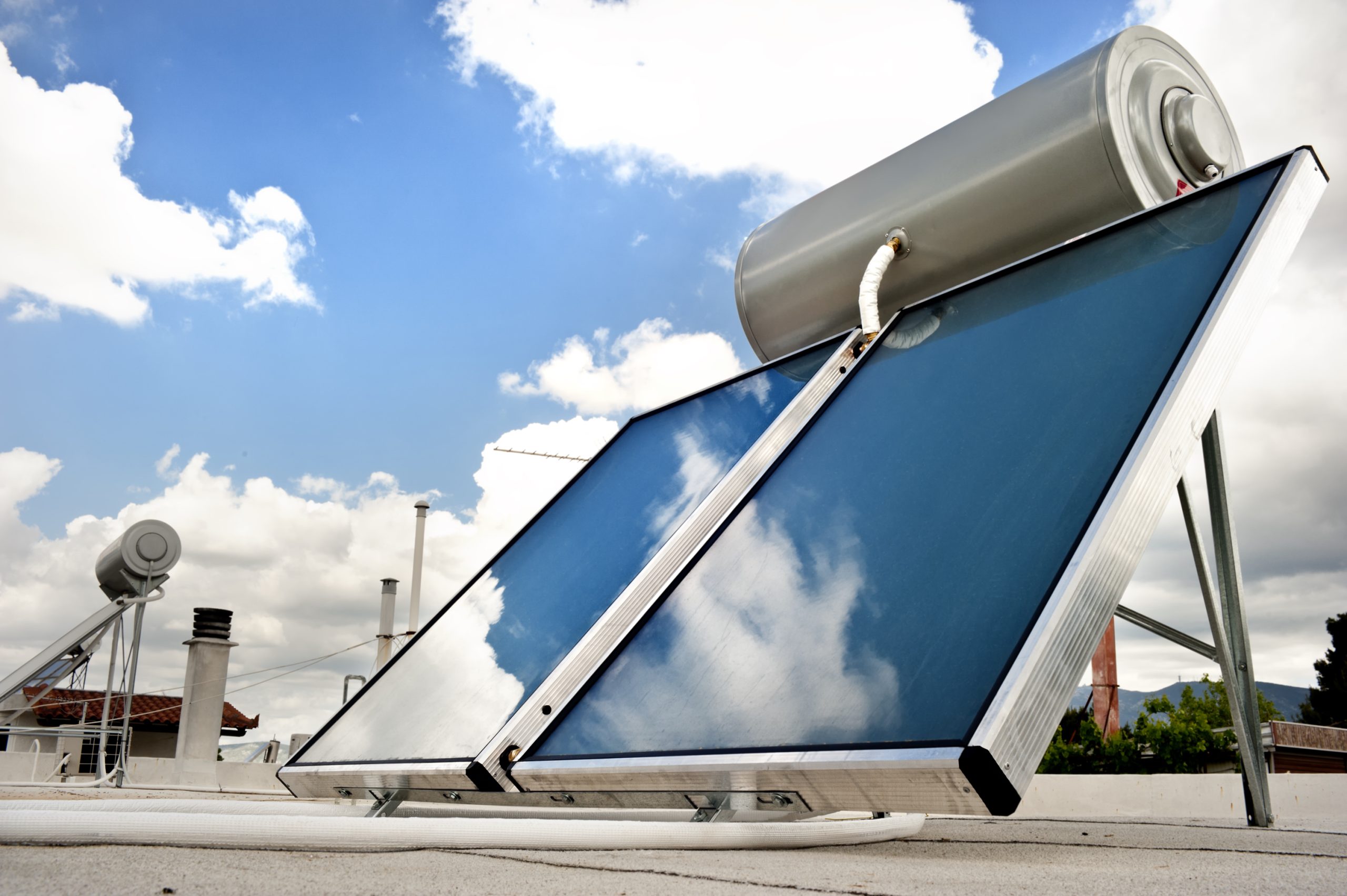Solar water heaters are used because they harness the energy from the sun to heat water, providing an eco-friendly and cost-effective alternative to traditional water heating methods. Solar water heaters utilize solar collectors to absorb and convert solar radiation into heat energy, which is then used to heat water for various purposes, such as domestic use, space heating, and swimming pool heating.
By utilizing solar energy, these systems reduce reliance on fossil fuels, lower carbon emissions, and offer long-term savings on energy bills. Additionally, solar water heaters have a low environmental impact, require minimal maintenance, and can be installed in both residential and commercial buildings.
With their numerous benefits, solar water heaters are a sustainable choice for efficient and affordable water heating.
The Basics Of Solar Water Heaters
Solar water heaters are becoming increasingly popular as an alternative energy solution for heating water in homes and commercial buildings. These innovative systems utilize the abundant and free energy from the sun to heat water, reducing reliance on conventional methods and providing both environmental and financial benefits. In this article, we’ll delve into the fundamentals of solar water heaters, exploring how they work, the different types available, and the key components that make up a solar water heating system.
How Do Solar Water Heaters Work?
Solar water heaters work by harnessing the energy from the sun and converting it into heat to warm water. The basic principle behind their functionality involves three main components: the solar collectors, the storage tank, and the circulation system.
The solar collectors are responsible for capturing the sun’s rays and converting them into heat. Typically, these collectors are made up of flat panels or evacuated tubes that are designed to absorb and retain solar energy. These panels are often placed on rooftops or other strategic areas where they can receive maximum sunlight exposure.
Once the solar collectors absorb the sun’s energy, it is transferred to a heat transfer fluid, such as water or a mixture of water and antifreeze. This fluid then flows into the storage tank through a circulation system, where the heat is transferred to the water in the tank.
The heated water is then ready for use, whether it’s for domestic purposes like bathing and washing dishes or for commercial applications such as in hotels or swimming pools.
Types Of Solar Water Heaters
There are two main types of solar water heaters: active and passive. Active solar water heaters rely on pumps and controls to circulate water through the system, while passive solar water heaters rely on natural convection and gravity to achieve water circulation.
Active systems are more commonly used in areas with colder climates or where larger quantities of hot water are required. They provide more control over the temperature and operation of the system. On the other hand, passive systems are simpler in design and are often more suitable for areas with warmer climates where freeze protection is not a major concern.
Key Components Of A Solar Water Heating System
A solar water heating system consists of several key components that work together to capture, store, and distribute solar energy to heat water:
- Solar collectors: These are the panels or tubes that absorb solar energy and convert it into heat.
- Heat transfer fluid: This fluid carries the heat from the collectors to the storage tank.
- Storage tank: This is where the heated water is stored until it is needed.
- Circulation system: This system facilitates the flow of the heat transfer fluid from the collectors to the storage tank.
- Backup heating system: In case of insufficient sunlight or high demand for hot water, a backup heating system is included to ensure a continuous supply of hot water.
By understanding the basics of how solar water heaters work and the various types available, you can make an informed decision about whether this renewable energy solution is suitable for your needs. With their ability to reduce energy consumption and reliance on non-renewable resources, solar water heaters offer a practical and eco-friendly way to heat water for both residential and commercial purposes.

Credit: www.cnet.com
Advantages Of Solar Water Heaters
Advantages of Solar Water Heaters
Solar water heaters are gaining popularity as a sustainable and cost-effective alternative to traditional water heating systems. By harnessing the power of the sun, these innovative technologies offer a range of advantages that make them an attractive choice for homeowners and businesses alike.
Energy And Cost Savings
Solar water heaters provide an excellent opportunity to reduce your energy consumption and save on utility bills. By utilizing renewable solar energy, these systems can significantly lower the amount of electricity or gas needed to heat water. This means substantial savings in the long run, as you can reduce your reliance on conventional energy sources and avoid the rising costs associated with them.
In fact, studies have shown that households using solar water heaters can save up to 50-80% on their water heating bills, depending on the location and the efficiency of the system. This makes solar water heaters a smart investment that quickly pays for itself over time.
Environmental Benefits
Choosing solar water heaters not only benefits your wallet but also positively impacts the environment. Compared to traditional water heating methods that rely on fossil fuels, solar water heaters produce zero greenhouse gas emissions during operation. This means a reduced carbon footprint and a significant contribution towards mitigating climate change.
Moreover, solar water heaters help conserve precious natural resources by reducing the demand for fossil fuels. Traditional water heating systems rely on non-renewable resources like coal, oil, or natural gas, which are not only finite but also contribute to air pollution and environmental degradation. By using solar energy, you can help protect the planet and promote sustainable practices for a greener future.
Reduced Reliance On Fossil Fuels
One of the most significant advantages of solar water heaters is their ability to reduce our dependence on fossil fuels. As global energy demand continues to rise, the need for sustainable alternatives becomes increasingly important. By harnessing the sun’s energy, solar water heaters offer a practical solution that can help reduce the reliance on finite resources like oil and natural gas.
In addition to energy security, reduced reliance on fossil fuels also brings economic benefits. As traditional energy sources become scarcer, prices are bound to rise. By investing in solar water heating systems, you can hedge against these future price increases and ensure long-term energy affordability.
Factors To Consider When Choosing Solar Water Heaters
When it comes to choosing the right solar water heater for your needs, several factors should be taken into consideration. By carefully evaluating these factors, you can ensure that you select a solar water heater that is best suited to your specific requirements, maximizing its efficiency and effectiveness.
Climatic Conditions And Sunlight Availability
One of the most crucial factors to consider when choosing a solar water heater is the climatic conditions and sunlight availability in your area. Solar water heaters rely on sunlight to heat the water, so it is essential to assess the amount of direct sunlight your location receives throughout the year. Areas with consistent and ample sunlight are ideal for solar water heaters, as they can generate more heat and provide hot water efficiently.
Moreover, the climate in your region also plays a significant role. Solar water heaters can work efficiently in various climates, but certain systems may perform better in specific conditions. For instance, if you live in an area with cold winters, you may want to consider an antifreeze or drain-back system to protect the water heater from freezing temperatures.
Size And Capacity Requirements
Another factor to consider when choosing a solar water heater is the size and capacity that will meet your household’s hot water needs. The size of the solar collector and storage tank should be determined based on factors such as the number of occupants in your home, the average daily hot water usage, and peak demand times.
To help you determine the appropriate size and capacity, consider consulting with a professional installer who can assess your specific requirements. They can calculate the necessary square footage of the collector and recommend the right-sized storage tank to ensure you have an adequate supply of hot water throughout the day.
Installation And Maintenance Considerations
Proper installation and maintenance are crucial for the long-term performance and durability of a solar water heater. When choosing a solar water heater, you should consider the installation requirements and complexity involved. Some systems are relatively straightforward to install, while others may require professional assistance.
Furthermore, maintenance requirements should also be taken into account. Regular maintenance, such as cleaning the solar collectors and inspecting the system for leaks or malfunctions, can ensure optimal performance. Additionally, you should consider the availability of maintenance services in your area.
It is also worth considering the cost-effectiveness of the system in terms of installation and maintenance. While solar water heaters are known for their energy-saving benefits, choosing a system that requires minimal maintenance and offers hassle-free installation can be more financially advantageous in the long run.
Common Applications Of Solar Water Heaters
While solar water heaters have gained popularity due to their eco-friendly nature and energy-efficient operation, they also have various common applications. From residential use to commercial and industrial settings, and even public and community projects, solar water heaters are versatile and provide an effective solution for heating water sustainably. In this article, we will explore the different uses of solar water heaters, highlighting their benefits and advantages in each application.
Residential Use
Solar water heaters are increasingly being utilized in residential settings, providing homeowners with an affordable and sustainable alternative to traditional water heating systems. By harnessing the power of the sun, solar water heaters can supply hot water for various household needs, including showers, baths, dishwashing, and laundry. With rising energy costs, installing a solar water heater can significantly reduce monthly utility bills while decreasing the carbon footprint of the household.
Commercial And Industrial Use
In addition to residential applications, solar water heaters are widely used in commercial and industrial settings. Restaurants, hotels, hospitals, and other businesses that require a significant amount of hot water on a daily basis can benefit greatly from installing solar water heating systems. These systems can handle high water demand and provide consistent hot water throughout the day, contributing to cost savings and reducing reliance on fossil fuel-based energy sources. By implementing solar water heaters, businesses can also enhance their environmental image and demonstrate their commitment to sustainable practices.
Public And Community Projects
Solar water heaters are also being utilized in public and community projects, showcasing their potential to benefit larger populations and promote sustainable development. Government buildings, schools, community centres, and sports facilities can all adopt solar water heating systems to meet their hot water needs while reducing their carbon emissions. These projects not only contribute to the overall environmental goals of a community but also serve as educational tools to raise awareness about renewable energy and inspire individuals to make more sustainable choices in their own lives.
Overcoming Challenges With Solar Water Heaters
When it comes to utilizing solar energy for water heating, there are a few challenges that need to be addressed. However, with advancements in technology and increasing environmental concerns, these challenges are being overcome, making solar water heaters a viable and sustainable option for many homeowners and businesses. In this article, we will explore three key challenges associated with solar water heaters and how they are being handled effectively.
Initial Investment And Payback Period
One of the common concerns about solar water heaters is the initial investment required. While it’s true that installing a solar water heating system involves an upfront cost, it’s essential to consider the long-term benefits. Despite the initial investment, solar water heaters can significantly reduce energy bills, leading to substantial savings in the long run.
The payback period is another aspect to consider. In general, the payback period for solar water heaters ranges from 3 to 7 years, depending on various factors such as the size of the system, location, and current energy costs. Once the payback period is over, homeowners and businesses can enjoy free hot water, lowering their monthly expenses and providing a return on their initial investment.
Backup Systems And Reliability
Reliability is always a concern when it comes to any type of technology, and solar water heaters are no exception. However, with advancements in design and technology, backup systems have been integrated into solar water heating systems to ensure hot water availability even during unfavorable weather conditions or high-demand periods.
The backup system typically comprises an electrical or gas-powered water heater that automatically activates when solar energy is insufficient. This ensures a continuous supply of hot water when needed, offering peace of mind to homeowners and businesses alike. Moreover, the reliability of solar water heaters is further enhanced by their low maintenance requirements, making them hassle-free and cost-effective in the long run.
Regulatory And Policy Support
To encourage the adoption of renewable energy technologies, many governments and regulatory bodies offer policy support and incentives for solar water heaters. These policies aim to make solar water heating systems economically viable and accessible to a wider audience.
Some of the common incentives include tax credits, rebates, grants, and low-interest financing options. These incentives not only help reduce the initial investment but also promote the environmental benefits of using solar energy for water heating. Additionally, regulatory support ensures standardization and quality control, providing reliability and confidence to individuals and businesses investing in solar water heating systems.
Frequently Asked Questions
Why Is Solar Water Heating Important?
Solar water heating systems use renewable energy from the sun to heat water, reducing the dependence on fossil fuels and decreasing carbon emissions. This cost-effective and eco-friendly solution can reduce energy bills and contribute to a more sustainable future.
How Do Solar Water Heaters Work?
Solar water heaters use collectors to absorb energy from the sun and transfer it to a heat transfer fluid. This heated fluid then passes through a heat exchanger, where it warms up the water used in homes or commercial buildings.
The process is efficient and reliable, providing hot water even on cloudy days.
What Are The Benefits Of Using A Solar Water Heater?
Using a solar water heater has many advantages. Firstly, it can significantly reduce energy bills by harnessing free energy from the sun. Additionally, it helps to mitigate the environmental impact by reducing carbon emissions. Solar water heaters are low-maintenance, durable, and can provide hot water throughout the year, making them a wise investment.
Conclusion
Solar water heaters are gaining popularity due to their numerous advantages. They are a sustainable and eco-friendly solution that can help reduce energy consumption and cut down on utility bills. With their ability to harness the power of the sun, solar water heaters provide a constant and reliable source of hot water.
Additionally, they require low maintenance and have a long lifespan, making them a cost-effective choice in the long run. By investing in solar water heaters, individuals can not only contribute to a greener environment but also enjoy the benefits of lower energy costs.

